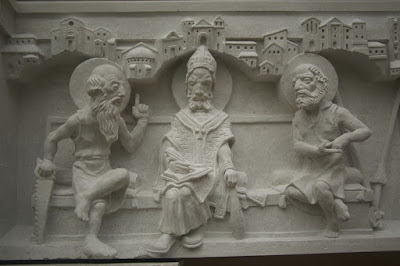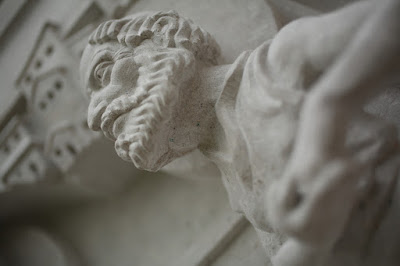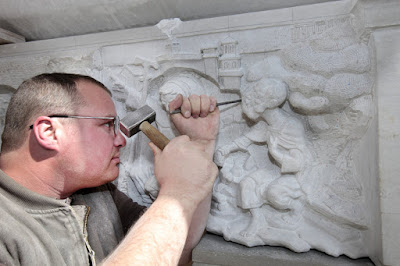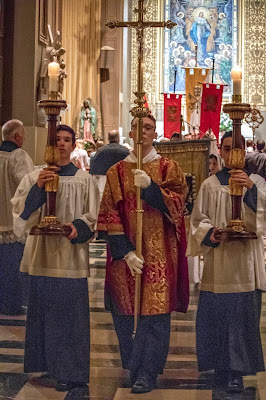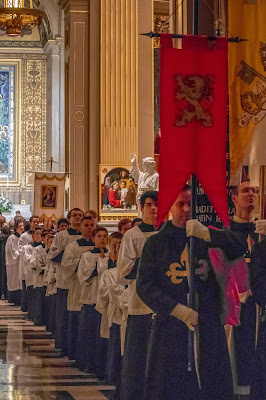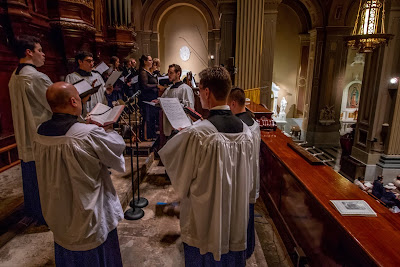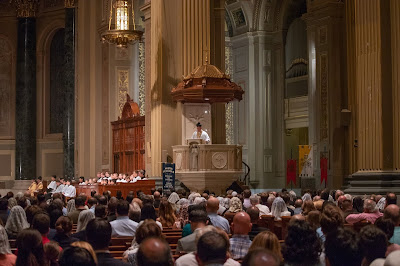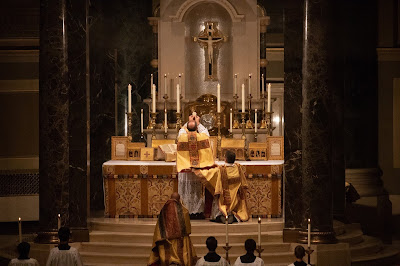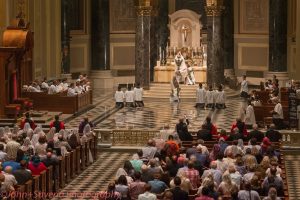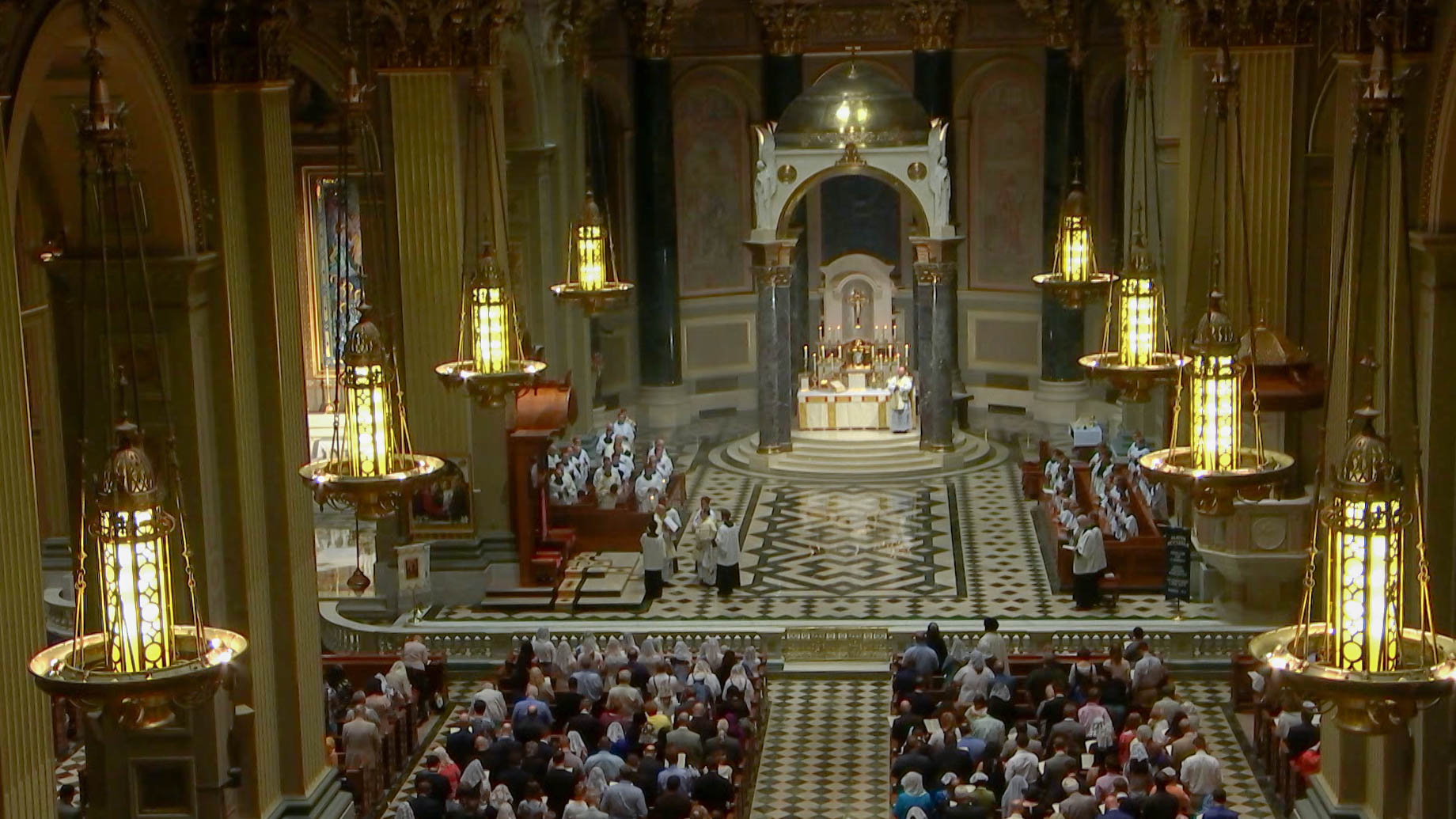Archbishop Guido Pozzo celebrated the Pontifical Mass in the Licheń Basilica and presided over Pontifical vespers. The faithful taking part in these celebrations and receiving the Papal blessing could receive a plenary indulgence under ordinary conditions by the decision of the Apostolic Penitentiary.
Category — Uncategorized
Catholic Sculptor Offers Apprenticeships
By David Clayton, taken from The New Liturgical Movement Blog: http://www.newliturgicalmovement.org/
I have just heard from Catholic sculptor Andrew Smith (whose work at Our Lady of Clear Creek Abbey in Oklahoma will be known to some reader of New Liturgical Movement) about an exciting development. He is getting ready to offer apprenticeships to willing students at his studio on the campus of St Gregory the Great Academy in Pennsylvania. He has made this decision after taking on an apprentice for the summer as an experiment.
Here is a detail of his Twelve Apostles at Clear Creek Abbey.
September 4, 2018 No Comments
Diocese of Harrisburg: Bishop Gainer Interview on the TLM and Vocations
By Gregory DiPippo of The New Liturgical Movement Blog
Back in May, we posted an item about a new Carmel which has been founded in Fairfield, Pennsylvania, in the diocese of Harrisburg, which uses the traditional Mass and Office, and is undergoing a surge in vocations. Last month, on the feast of St James the Apostle, His Excellency Ronald Gainer, the bishop of Harrisburg, celebrated a Pontifical High Mass in the Extraordinary Form to officially open the monastery and bless the new buildings, still, as you will see, very much under construction. After the Mass, he gave this interview in which he speaks among other things of the traditional liturgy as a powerful source of religious vocations. For more information about the Fairfield Carmel, see their website here: https://www.fairfieldcarmelites.org/. We thank and congratulate Bishop Gainer for his support of this important initiative, and pray that it will bear much fruit for the Church in his diocese.
September 3, 2018 No Comments
“They That Are Christ’s Have Crucified Their Flesh with the Vices and Concupiscencesâ€
By Dr.
There are times when the message can be rather subtle, requiring well-trained ears. But there are other times when it seems as if Our Lord is positively whacking us over the head with the obviousness of His message to the Church. One such occasion was surely yesterday’s Mass for the Fourteenth Sunday after Pentecost, with readings and orations that the Church has proclaimed on this Sunday for 1,500 years or more — and still does, wherever the Roman Rite endures in its classical form.
The Epistle of the Mass is taken from Galatians, a letter of ever-growing relevance in the ecclesiastical situation in which we find ourselves today (one thinks of such luminous passages as “But though we, or an angel from heaven, preach a gospel to you besides that which we have preached to you, let him be anathema†and “When Cephas [Peter] was come to Antioch, I withstood him to the face, because he was to be blamedâ€), and more particularly, from chapter 5, with its famous contrast between the works of the flesh and the fruit of the Spirit:
Brethren: Walk in the spirit, and you shall not fulfil the lusts of the flesh: for the flesh lusteth against the spirit, and the spirit against the flesh; for these are contrary one to another, so that you do not the things that you would. But if you are led by the spirit, you are not under the law. Now the works of the flesh are manifest, which are fornication, uncleanness, immodesty, luxury, idolatry, witchcrafts, enmities, contentions, emulations, wraths, quarrels, dissensions, sects, envies, murders, drunkenness, revellings, and such like; of the which I foretell you, as I have foretold to you, that they who do such things shall not obtain the kingdom of God. But the fruit of the spirit is: charity, joy, peace, patience, benignity, goodness, longanimity, mildness, faith, modesty, continency, chastity. Against such there is no law. And they that are Christ’s have crucified their flesh with the vices and concupiscences.
As each day brings with it fresh revelations of clerical corruption in high places — indeed, in the very highest place of all, the seat of Cephas in Rome, whence proceeds a Gospel other than the one Christ and His apostles preached to us — we are comforted and strengthened by hearing these uncompromising words of St. Paul, who assures us that whoever does these works of the flesh, as well as they who approve or support those who do them or fail to take action against them, cannot be acting by the Spirit of Christ. (Indeed, as the Apostle teaches in Romans 1:32, with a nod to the death penalty: “Who, having known the justice of God, did not understand that they who do such things are worthy of death; and not only they that do them, but they also that consent to them that do them.â€)
They that are Christ’s have crucified their flesh with the vices and concupiscences. On the very Sunday of the Viganò revelations, this is the message of liturgical providence for the Church in the United States of America, in the Vatican, and everywhere. They that are truly Christ’s will live a mortified life of battle against disordered concupiscence, striving for holiness in a relentless military campaign against interior vices and against the external manifestations of vice over which they have any control, especially if they have been given positions of authority by God.
And lest we rely on our own strength or on that of any earthly protector, the Collect of the Mass and the Gradual teach us where our victory will come from:
Keep, we beseech Thee, O Lord, Thy Church with perpetual peace; and because the frailty of man without Thee cannot but fall, keep us ever by Thy help from all things hurtful, and lead us to all things profitable to our salvation. Through our Lord.
The Gradual of this day’s Mass tells us soberly and simply:
It is good to confide in the Lord, rather than to have confidence in man. V. It is good to trust in the Lord, rather than to trust in princes.
The Introit cries out: “Behold, O God, our protector, and look on the face of Thy Christâ€! Many are they who feel like sheep abandoned by their supreme shepherd, abandoned to the wolves. At times like this, we feel and we know that God is our sole protector. Because He is looking on the face of His Christ, His well-beloved Son on whom His favor rests, and seeing us in Him, He loves us and will never abandon us.
In The Saint Andrew Daily Missal from 1945, each Sunday is preceded by a lengthy commentary on the readings and prayers of that day in the Divine Office and in the Mass. I am struck by two things about these commentaries: first, how tough they are (the doctrine is clear, its moral demands are stated with no compromise, and salutary rebukes are offered to the reader as an examination of conscience); second, how apropos they are to the tragic situation of the Church today, since they frequently diagnose the very diseases of intellect, will, and passions that harass us on all sides.
Here is part of the commentary offered for the Fourteenth Sunday after Pentecost:
St. Gregory says: “There are men, all athirst for passing joys, who are ignorant or indifferent where eternal blessings are concerned. Poor wretches! They congratulate themselves on possessing the good things of this life without regretting those of the world above, which they have lost. Fashioned for light and truth, they never lift up the eyes of the soul; never betray the smallest desire or longing for the contemplation of their eternal home. Giving themselves over to the pleasures among which they are thrown, they bestow their affection upon a dreary place of exile as if it were their fatherland; and surrounded by darkness, they are full of rejoicing as if they were illumined by a brilliant light. On the other hand, the elect, in whose eyes fleeting goods are of no value, seek after those for which their souls were made. Kept in this world by the bonds of the flesh, each, none the less, is carried in spirit beyond it while making the wholesome resolve to despise the passing things of time and to desire the things which endure for eternity.â€[2]
In a rare instance of alignment of liturgical planets, the readings of yesterday’s Ordinary Form Mass, for the Twenty-First Sunday in Ordinary Time (Year B), deliver the same message.
The first reading shows Joshua (Jesus) summoning all the tribes, their elders, their leaders, their judges, and their officers, and asked them whom they will serve — the true God, or the gods of the nations round about. In other words, accommodation to the world, or fidelity to God the revealer? The people respond:
“Far be it from us to forsake the LORD
for the service of other gods.
For it was the LORD, our God,
who brought us and our fathers up out of the land of Egypt,
out of a state of slavery.â€
This is the state of slavery St. Paul is describing with his “works of the flesh.â€
The Sunday psalm declares:
The LORD has eyes for the just,
and ears for their cry.
The LORD confronts the evildoers,
to destroy remembrance of them from the earth.
The second reading, Ephesians 5:21–32, affirms traditional Catholic doctrine on marriage, with a strong emphasis on its heterosexual essence as a reflection of the relationship of Christ and the Church, with the Church being subordinate to Christ, who calls her to be “holy and without blemish.â€
The Gospel, from John chapter 6, begins right after the Lord Jesus has finished His discourse about the Eucharist as the true flesh and blood of the Son of Man: “This saying is hard; who can accept it?†This saying is indeed hard — like the sayings of Jesus about divorce, about celibacy, about welcoming the little children, and about the need for chastity and purity if we would enter the kingdom of heaven. In words that uncannily parallel those of the Epistle in the usus antiquior, Jesus says:
It is the spirit that gives life, while the flesh is of no avail.The words I have spoken to you are Spirit and life.
But there are some of you who do not believe.
Jesus knew from the beginning the ones who would not believe
and the one who would betray him.
Jesus knew from the beginning the ones who would not believe, and the one who would betray him — the lay people, religious, deacons and priests, and bishops, and the Judas in each generation, in whom the features of the Antichrist yet to appear are glimpsed as in a dark mirror.
May the striking liturgical providence of God, displayed on this Sunday of infamy, August 26, 2018, be an aid for us, a confirmation, a consolation, and a challenge, as we strive to reject Satan and his pomps and the works of the flesh, and cleave ever more to Christ the Head of the Church, the gardener who makes the fruit of the spirit grow within and around us.
September 3, 2018 No Comments
First Friday and First Saturday TLM’s for September, 2018
The Traditional Latin Mass will be offered on Saturday, September 1st and Friday, September 7th at:
(215) 884-4022
Confession and Mass will be upstairs, both Saturday and Friday.  Due to continuing construction, please enter the church through the doors on West Avenue.
August 31, 2018 No Comments
Assumption Mass 2018
August 29, 2018 No Comments
How Tradition Fosters Priestly Humility

FROM THE DESK OF FR. ERIC ANDERSEN
ST. STEPHEN CATHOLIC CHURCH, PORTLAND, OREGON.
I spent this last week at a Eucharistic Conference with a group of priests who are interested and involved with the Extraordinary Form of the Roman Liturgy.
Each day at this annual Eucharistic Conference, a Solemn Latin Mass is celebrated with deacon and subdeacon. It is handy that there are about 15 priests in attendance from all over the country. Throughout the week, we switch off with the roles of celebrant, deacon, subdeacon, MC 1, MC 2, Schola, hearing Confessions, etc. We also have nightly Conference talks at dinner given by the various priests and the local bishop. It gives us an opportunity for priestly fraternity and for doing what priests do: liturgy.
Since there is no concelebration in the old Roman rite, each priest must say his own private Mass each day unless he is the celebrant for the Solemn Mass. This is a good thing because instead of one Mass being concelebrated, there are 15 Masses each day celebrated by the priests in attendance. Imagine the blessings that flow from 15 Masses being celebrated instead of just one Mass!
In this case, the various priests in attendance generally serve for one another. One priest will celebrate a Low Mass at a side altar with another priest as his server, then they will switch and the one having just been served will serve for the other priest as he celebrates his Mass.
During the week, I reflected on this particular activity. It is so good for a priest’s spiritual life: for his sense of humility; his brotherly charity; his reverence for the dignity of the priesthood itself; and for his sense of service to others that he would get down on his knees before the altar and serve for another priest.
This is not something that priests ordinarily do in the Ordinary Form (Modern Roman Rite). In the Modern Rite, priests typically concelebrate at one Mass with each other. They would not generally think to serve at Mass for another priest. The only time that a priest would get down on his knees liturgically to serve others would be on Holy Thursday at the optional washing of the feet. This is an optional practice in the Ordinary Form and it is generally only done by a priest who is a pastor, a religious superior, or a bishop. Therefore, how many priests are there who would never get down on their knees in service to others?
This is unfortunate. Many priests do not get the opportunity to serve Mass for another priest. Instead, we priests become accustomed to being served at the altar. The danger of being one who is always served is that we priests might forget that we are not called to be served but to serve. The reality is that we priests are not being served at the altar, but the Lord Jesus Christ is the true High Priest being served.
The priest should not take this glory for himself. He should be one who serves the Lord and those entrusted to his care. We priests are often treated with deference by our parishioners. It is true that this is because we are at their service. Our lives are sacrificial. We offer Mass, hear Confessions, witness their marriages, baptize their babies, anoint the sick, and bury the dead. In all this we keep quite busy and we are of service to the Lord and those entrusted to our care.
But there is something very valuable in being able to serve at Mass for another priest: to get down on one’s knees in service. It is humbling and that is good for the priest and his spiritual life.
Photo credit: Rodrigo Guerra
August 22, 2018 No Comments
August 15, 2018 Solemn High Tridentine Mass, Feast of the Assumption, at the Cathedral Basilica of Sts. Peter and Paul, 18th and Race Sts., Philadelphia, Pa.
Assumption Mass, August 15, 2018
Mater Ecclesiae Roman Catholic Church will celebrate its 18th Annual Mass of Thanksgiving for the Feast of the Assumption on Wednesday, August 15th, at 7 p.m. at The Cathedral Basilica of Saints Peter and Paul, 18th Street and Benjamin Franklin Parkway, Philadelphia, Pennsylvania. The Reverend Robert C. Pasley, KCHS, Rector of Mater Ecclesiae, will be the Celebrant.
Parking at the Cathedral is available in the adjoining parking lot (enter the parking lot through the north 17th Street Entrance, located on the north side of the Diocesan Administration Building at 222 N. 17th Street), and at the underground garage at the Sheraton Hotel on 17th Street. A link to directions at the Cathedral’s website is here.
The Solemn High Tridentine Mass will once again feature the Ars Laudis Festival Chorus and Orche, stra. Our Cantor Mr. Nicholas Beck, a graduate of Westminster Choir College, will direct the singing of the Gregorian Propers. Dr. Timothy McDonnell will be the conductor.
Mater Ecclesiae celebrates this feast each year by the use of the great treasury of Sacred Music, especially the beautiful polyphonic Masses that are very infrequently prayed in their proper place: the Sacred Liturgy. We want to foster a greater love for the great works of our Catholic heritage.
The setting for this year’s Assumption Mass will be Antonio Caldara’s (1670–1736) Missa Commemorationis, from the Catholic Baroque period, a time of unrivaled artistic enterprise in central Europe. It dates from 1729, when Caldara, born in Venice and long associated with Rome, was well ensconced in the musical scene of imperial Vienna as Vize-Kapellmeister. This performance of the Missa Commemorationis is from a new edition of the work completed by conductor Timothy McDonnell, and is only the second known performance of this work in the United States.
In addition, the Mass will include works by composers Wolfgang Almadeus Mozart (1756-1791), Tomaso Albinoni (1671-1751), and Antonio Vivaldi (1678-1741). Beata es, Virgo Maria, by Renaissance master Hans Leo Hassler (1564–1612), will be sung at the Offertory. Holy Communion will feature Girolamo Frescobaldi’s (1583–1643) Ave Virgo Gloriosa, and a selection composed in the New World, Coenantibus autem illis, by Mexican composer, Juan de Lienas (fl.ca. 1640). A new work by Timothy McDonnell, Dicit Mater Eius, pays homage to the polyphonic tradition of the Church.
In order to sponsor such grand music we cannot depend on our little parish of 500 families. We need the help of everyone in the Delaware Valley who wants to foster excellent sacred music as well as support professional musicians who have been blessed by God with a magnificent talent. I, therefore, appeal to you for financial assistance. We need to raise at least $11,500.00. Any money that is raised over the amount needed will be put directly in the Sacred Music Fund.
To donate, click here for the Patron Donation Form, or send a check to Mater Ecclesiae Roman Catholic Church, 261 Cross Keys Rd., Berlin, NJ 08009-9431. When we receive the donation, we will send a letter acknowledging receipt that can be used for tax purposes. We will also put your name before the statue of Saint Jude, and specifically remember all the donors at our Perpetual Novena to St. Jude on Wednesdays starting August 22nd.
Parking at the Cathedral is available in the adjoining parking lot and at the underground garage at the Sheraton Hotel on 17th Street. A link to directions at the Cathedral’s website is here.
Click here for the donation form.
Assumption Mass, August 15, 2018
Wednesday, August 15, 2018, 7:00 p.m.
Solemn High Tridentine Mass for the Feast of the Assumption
Cathedral Basilica of Saints Peter and Paul, Philadelphia, PA
Celebrated by Father Robert C. Pasley, KCHS, Rector
Mater Ecclesiae Roman Catholic Church.
Mater Ecclesiae Roman Catholic Church will celebrate its 18th Annual Mass of Thanksgiving for the Feast of the Assumption on Wednesday, August 15, 7 p.m. at The Cathedral Basilica of Saints Peter and Paul, 18th Street and Benjamin Franklin Parkway, Philadelphia, Pennsylvania. The Reverend Robert C. Pasley, KCHS, Rector of Mater Ecclesiae, will be the Celebrant.
The Solemn High Tridentine Mass will once again feature the Ars Laudis Festival Chorus and Orchestra. Our Cantor Mr. Nicholas Beck, a graduate of Westminster Choir College, will direct the singing of the Gregorian Propers. Dr. Timothy McDonnell will be the conductor.
Mater Ecclesiae celebrates this feast each year by the use of the great treasury of Sacred Music, especially the beautiful polyphonic Masses that are very infrequently prayed in their proper place: the Sacred Liturgy. We want to foster a greater love for the great works of our Catholic heritage.
The setting for this year’s Assumption Mass will be Antonio Caldara’s (1670–1736) Missa Commemorationis, from the Catholic Baroque period, a time of unrivaled artistic enterprise in central Europe. It dates from 1729, when Caldara, born in Venice and long associated with Rome, was well ensconced in the musical scene of imperial Vienna as Vize-Kapellmeister. This performance of the Missa Commemorationis is from a new edition of the work completed by conductor Timothy McDonnell, and is only the second known performance of this work in the United States.
In addition, the Mass will include works by composers Wolfgang Almadeus Mozart (1756-1791), Tomaso Albinoni (1671-1751), and Antonio Vivaldi (1678-1741). Beata es, Virgo Maria, by Renaissance master Hans Leo Hassler (1564–1612), will be sung at the Offertory. Holy Communion will feature Girolamo Frescobaldi’s (1583–1643) Ave Virgo Gloriosa, and a selection composed in the New World, Coenantibus autem illis, by Mexican composer, Juan de Lienas (fl.ca. 1640). A new work by Timothy McDonnell, Dicit Mater Eius, pays homage to the polyphonic tradition of the Church.
In order to sponsor such grand music we cannot depend on our little parish of 500 families. We need the help of everyone in the Delaware Valley who wants to foster excellent sacred music as well as support professional musicians who have been blessed by God with a magnificent talent. I, therefore, appeal to you for financial assistance. We need to raise at least $11,500.00. Any money that is raised over the amount needed will be put directly in the Sacred Music Fund.
To donate, click here for the Patron Donation Form, or send a check to Mater Ecclesiae Roman Catholic Church, 261 Cross Keys Rd., Berlin, NJ 08009-9431. When we receive the donation, we will send a letter acknowledging receipt that can be used for tax purposes. We will also put your name before the statue of Saint Jude, and specifically remember all the donors at our Perpetual Novena to St. Jude on Wednesdays starting August 22nd.
Parking at the Cathedral is available in the adjoining parking lot and at the underground garage at the Sheraton Hotel on 17th Street. A link to directions at the Cathedral’s website is here.
August 14, 2018 No Comments
Coronation of Pope John XXIII
https://youtu.be/nQzybS–g8Q
August 9, 2018 No Comments
2018 “Ars Celebrandi” Latin Mass Workshop – Poland, From Rorate Caeli Blogspot
Watch and See: Beautiful Video and Images from the 2018 “Ars Celebrandi” Latin Mass Workshop – Poland
August 5, 2018 No Comments
First Friday and First Saturday Traditional Latin Masses for August, 2018
The Traditional Latin Mass will be offered on Friday, August 3rd and Saturday, August 4th at:
(215) 884-4022
Confession and Mass will be upstairs, both Friday and Saturday.
Time: 7:00Â p.m., preceded by Confession at 6:30Â p.m.
This Traditional Latin Mass will be the Mass of The Sacred Heart of Jesus with Commemoration of The Finding of the Body of St. Stephen, offered in Reparation to The Sacred Heart of Jesus. (White Vestments)
Time: 9:00 a.m., preceded by Confession at 8:30 a.m.
August 1, 2018 No Comments

